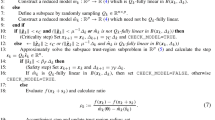Abstract
This paper presents a hybrid ODE-based method for unconstrained optimization problems, which combines the idea of IMPBOT with the subspace technique and a fixed step-length. The main characteristic of this method is that at each iteration, a lower dimensional system of linear equations is solved only once to obtain a trial step. Another is that when a trial step is not accepted, this proposed method uses minimization of a convex overestimation, thus avoiding performing a line search to compute a step-length. Under some reasonable assumptions, the method is proven to be globally convergent. Numerical results show the efficiency of this proposed method in practical computations, especially for solving small scale unconstrained optimization problems.







Similar content being viewed by others
References
Yuan, Y.X., Sun, W.Y.: Optimization Theory and Methods. Science Press, Beijing (1997) (in Chinese)
Brown, A.A., Biggs, M.C.: Some effective methods for unconstrained optimization based on the solution of system of ordinary differentiable equations. J. Optim. Theory Appl. 62, 211–224 (1989)
Han, L.X.: On the convergence properties of an ODE algorithm for unconstrained optimization. Math. Numer. Sin. 15, 449–455 (1993)
Higham, D.J.: Trust region algorithms and timestep selection. SIAM J. Numer. Anal. 37, 194–210 (1999)
Brown, A.A., Biggs, M.C.: ODE versus SQP methods. J. Optim. Theory Appl. 62, 371–386 (1989)
Andrei, N.: Gradient flow algorithm for unconstrained optimization. ICI Technical Report (March 4, 2004). http://csmo.ici.ro/neculai/anman.htm
Luo, X.L., Kelley, C.T., Liao, L.Z., Tam, H.W.: Combining trust-region techniques and Rosenbrock methods to compute stationary points. J. Optim. Theory Appl. 140, 265–286 (2009)
Ortega, J.M., Rheinboldt, W.C.: Interative Solution of Nonlinear Equations in Several Variables. Academic Press, New York (1970)
Nocedal, J., Yuan, Y.X.: Combing trust region and line search techniques. In: Yuan, Y.X. (ed.) Advances in Nonlinear Programming, pp. 153–175. Kluwer Academic, Dordrecht (1998)
Gertz, E.M.: A quasi-Newton trust region method. Math. Program., Ser. A 100, 447–470 (2004)
Barzilai, J., Borwein, J.M.: Two point step size gradient methods. IMA J. Numer. Anal. 8, 141–188 (1988)
Raydan, M.: The Barzilai and Borwein method for the large-scale unconstrained minimization problem. SIAM J. Optim. 7, 26–33 (1997)
Sun, J., Zhang, J.P.: Global convergence of convergence of conjugate gradient methods without line search. Ann. Oper. Res. 103, 161–173 (2001)
Mo, J.T., Zhang, K.C., Wei, Z.X.: A nonmonotone trust region method for unconstrained optimization. Appl. Math. Comput. 171, 371–384 (2005)
Ou, Y.G., Zhou, Q., Lin, H.C.: An ODE-based trust region method for unconstrained optimization problems. J. Comput. Appl. Math. 232, 318–326 (2009)
Wang, Z.H., Yuan, Y.X.: A subspace implementation of quasi-Newton trust region methods for unconstrained optimization. Numer. Math. 104, 241–269 (2006)
Shi, Z.J., Xu, Z.W.: The convergence of subspace trust region methods. J. Comput. Appl. Math. 231, 365–377 (2009)
Yuan, Y.X.: Subspace methods for large scale nonlinear equations and nonlinear least squares. Optim. Eng. 10, 207–218 (2009)
Dai, Y.H., Liao, L.Z.: R-linear convergence of the Barzilai and Borwein gradient method. IMA J. Numer. Anal. 22, 1–10 (2002)
Liu, D.C., Nocedal, J.: On the limited memory BFGS method for large scale optimization. Math. Program. 45, 503–528 (1989)
Byrd, R., Nocedal, J., Schnabel, R.: Representations of quasi-Newton matrices and their use in limited memory methods. Math. Program. 63, 129–156 (1994)
More, J., Garbow, B., Hillstrom, K.: Testing unconstrained optimization software. ACM Trans. Math. Softw. 7, 17–41 (1981)
Andrei, N.: An unconstrained optimization test functions collection. Adv. Model. Optim. 10(1), 147–161 (2008)
Dolan, E.D., More, J.: Benchmarking optimization software with performance profiles. Math. Program., Ser. A 91, 201–213 (2002)
Acknowledgements
The authors are very grateful to the editor and the anonymous referees for their valuable comments and suggestions that greatly improved this paper.
Author information
Authors and Affiliations
Corresponding author
Additional information
Partially supported by NNSF of China (No. 11161016) and NSF of Hainan Province (No. 111001).
Rights and permissions
About this article
Cite this article
Ou, Yg., Wang, Gs. A hybrid ODE-based method for unconstrained optimization problems. Comput Optim Appl 53, 249–270 (2012). https://doi.org/10.1007/s10589-012-9455-1
Received:
Published:
Issue Date:
DOI: https://doi.org/10.1007/s10589-012-9455-1




